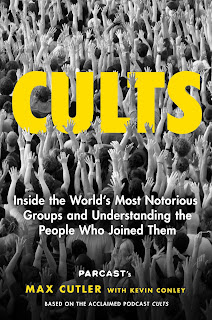About two months ago, I went to see Where The Crawdads Sing at a Regal movie theater. If you don't know, Where The Crawdads Sing has been a mega-bestseller and is still on the bestseller list for USA Today and other lists. As we exited the movie and deposited our candy in the proper receptacle (I added that as virtue signaling), the conversation buzz was all:
"Did you think it was as good as the book"
"I thought the movie was better than the book."
"No, the audiobook was better than the book and the movie."
Anyway, transferring highly successful content from one medium to another is often fraught with danger. The stakes are high. Expectations are even higher. And disappointment and bitterness are only a slight miscalculation away. Remember The Green Lantern movie or Fantastic Four?
I just finished the book Cults, which is modeled on the successful podcast Cults. I know you are dying to know: Which was better? The podcast? The book? Get ready for a letdown, and it's acceptable if you attack me (not physically, I have the upper body strength of a newborn).
The book and the podcast complement each other so well that I cannot in good conscience raise a hand in victory for the book or the podcast. The audio on the podcast brings an immersive quality that the book cannot duplicate. The book, however, adds depth, detail, and the narrative resonance that the podcast cannot replicate.
Before I go any further, I highly recommend the book, even if you've never listened or even heard of the Cults podcast.
Here is the tagline for the Cults book: "Cults is an unflinching exploration into what happens when the most vulnerable recesses of the mind are twisted into the lowest forms of malevolence — revealing eye-opening details which will surprise even the most devoted true-crime fan. If you love the Cults podcast, this is the next-level companion that will take you deeper into the dark side of human nature than ever before. Ten disreputable cult leaders. Ten stories of power, mystery, and destruction."
That's not hyperbole typical of a book tagline. Reading about the evil unleashed by these cult leaders is indeed a perilous journey into psychic darkness.
Once I finished the book, recurring themes assert themselves. First, these cult leaders have led miserable lives, especially in childhood. Charles Manson, who had a partying mother who was imprisoned for armed robbery. The boy was then moved around with relatives, none of which were thrilled to have him. When Manson was in first grade, his Uncle Bill forced him to wear a dress to school to toughen him up because Manson had come home the previous day crying about his sadistic teacher's treatment of him.
Adolfo de Jesus Constanzo, who killed at least 16 people in Mexico, often through torture and ritualistic practices, grew up in a home surrounded by animal filth and the rotting remains of animal sacrifices from his family.
David Koresh, leader of the Branch Davidians, was abandoned by his mother and left with a mentally ill Aunt until his mother returned with an alcoholic husband, who physically abused the boy.
Second, the cult followers are often people with low self-esteem who had been ostracized by society and desperately search for connection and belonging. The cult leader's outreach to them is their lifeline to imbuing their existence with meaning.
Third, these cult leaders inevitably begin to abuse their own followers as their "God Complex" overtakes them.
The book is not simply a gruesome retelling of the heinous crimes these cults leaders committed or the hypnotic hold they possessed over their followers. It's a psychological investigation of the many motives behind groups like NXIVM, Heaven’s Gate,
the Peoples Temple, and more, taking an expanded look at the people who
led and followed the most radical
organizations in history. What powers did their leaders possess? How
did their followers operate within the world? Why did their beliefs
stick, even after they’d grown bizarre?
The book's authors Max Cutler and Kevin Conley weave ten tales of cult leaders and their followers that do not try to simply explain what happened, but why. The narrative flow here is impressive, with each of the ten stories given its own identity and evil footprint.
The book is clearly a smooth, mutually beneficial collaboration between the two authors, Cutler and Conley.
Max Cutler created and founded Parcast Studios in 2016. Cutler built the nascent podcast network into a successful and growing entity. Spotify then acquired Parcast in 2019, even though Cutler still maintains his role as head of the studio. Cutler and his team have secured exclusive deals with influential voices in podcasting like Brené Brown and Alex Cooper. He currently leads the teams behind Spotify Kids & Family programming, which includes a partnership with family media company Moonbug Entertainment and their new podcast CoComelon Storytime.
Kevin Conley is the author of the national bestseller Stud: Adventures in Breeding and The Full Burn: On the Set, at the Bar, Behind the Wheel, and Over the Edge with Hollywood Stuntmen. A former editor at The New Yorker, he has written for GQ, Sports Illustrated, and The New York Times Magazine, among others.
The Cults podcast can be found here and the podcast's latest target is "The Moonies," who are devout followers of Sun Myung Moon, the founder of the Unification church.
The Cults book can be found here. As much as I enjoy the podcast, you can read the book and fully enjoy it without having ever listened to the podcast. What I suspect will happen, however, is that finishing the book will spur many people to investigate the podcast.
(Note: Special thanks to Samantha Shier)

Comments
Post a Comment
Thank You for your input and feedback. If you requested a response, we will do so as soon as possible.